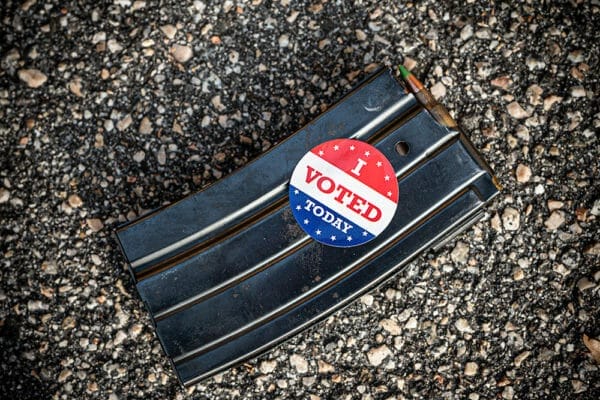
Maine/Kansas/United States – -(AmmoLand.com)- As the general elections approach, some Second Amendment supporters will not be happy with the options on the ballot. That is understandable – and it will be the case for each and every loyal Ammoland reader at some point in time if it hasn’t already happened.
That said, it is time for a reality check, including digesting some hard facts. The first one is that the pro-Second Amendment candidate who loses a general election will not be casting any votes in the state legislature or Congress. They won’t take any actions as a governor, attorney general, secretary of state, or any other statewide office.
The Primary Side
In some states, primary elections are still pending. Second Amendment supporters can pick the best candidate possible. But how does one define the “best” candidate? It’s not always a clear-cut answer.
Case in point: The U.S. Senate race in Kansas in 2020. That year, Kris Kobach and Roger Marshall fought it out in a primary to replace Pat Roberts. Kobach had won some statewide races, but he also had lost high-profile races for the House (in 2004) and for governor (in 2018). In the latter race, Kobach got 43 percent of the vote, while the anti-Second Amendment extremist Democrat got 48 percent to win the election.
Kobach ran 16 points behind the Republican nominee for attorney general that year. He was almost 20 points behind the GOP nominee for insurance commissioner and just under 15 points behind the GOP nominee for state treasurer. They cruised to victories with the headwinds of 2018, unlike Kobach.
Kobach is now running for attorney general to replace Derek Schmidt, who is challenging anti-Second Amendment extremist Laura Kelly in the governor’s race. Now, 2022 will feature strong tailwinds for GOP candidates due to Biden’s unpopularity, but the fact that Kobach has lost high-profile races for Congress and the governorship is a factor to consider. Sometimes, the blander generic candidate will be more likely to win in November.
Come November
Next, we move to look at Maine. We’ve discussed the race for Maine’s U.S. Senate seat, with Susan Collins – a solidly pro-Second Amendment senator, running against an anti-Second Amendment extremist. But there are some other notes to consider.
Collins has not been horrible on Second Amendment issues. She did vote for Biden, anti-Second Amendment SCOUTS nominee, among others. However, she has generally voted to confirm pro-Second Amendment nominees (no vote on Amy Coney Barrett notwithstanding).
She’s not perfect by any means, but given the general political terrain in Maine (no Republican has won the presidential election statewide since 1988, and in 2020, Donald Trump lost statewide by 9 points), that seat is, in some ways, a bonus for Second Amendment supporters, and has been since Collins first won in 1996.
It should be noted that Collins won her race with 51 percent of the vote – about 7 points ahead of Trump’s total. Maine also used “ranked-choice” voting, which took out a pro-Second Amendment incumbent in 2018.
On the flip side, the second Congressional district (Maine divvies up its electoral votes by congressional district with two votes for the statewide winner) gave Trump a bit over 52 percent of the vote. The Republican candidate for the House ran five points behind Trump. Could a more Collins-like candidate have flipped that seat? We can’t know for certain, but we do know that in Maine, Second Amendment supporters will have different general election conditions than those in Alabama. The imperfect pro-Second Amendment senator in difficult political terrain is better than the down-the-line anti-Second Amendment extremist.
Second Amendment supporters will have to do a lot of thinking in the primary elections that are coming. But one eye must also be on winning the general elections – the ones that decide who takes office – as well. It is in the general elections where anti-Second Amendment extremists must be defeated via the ballot box at the federal, state, and local levels.
About Harold Hutchison
Writer Harold Hutchison has more than a dozen years of experience covering military affairs, international events, U.S. politics and Second Amendment issues. Harold was consulting senior editor at Soldier of Fortune magazine and is the author of the novel Strike Group Reagan. He has also written for the Daily Caller, National Review, Patriot Post, Strategypage.com, and other national websites.
